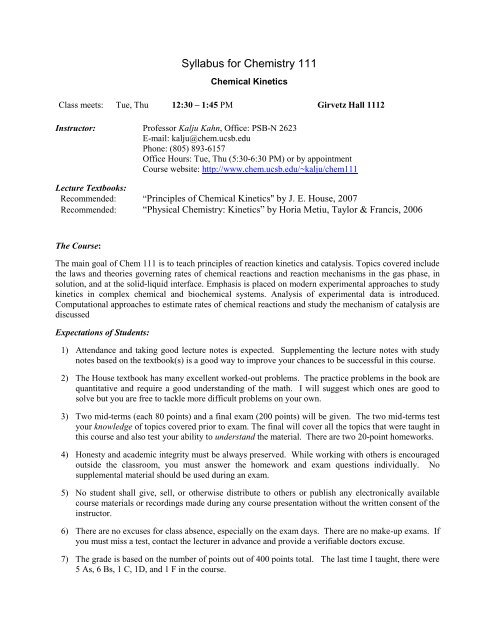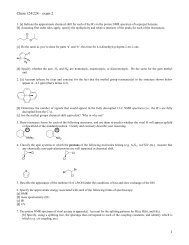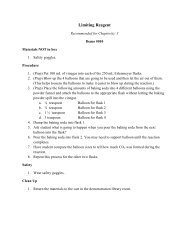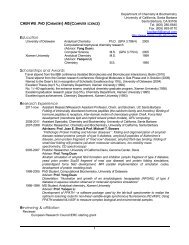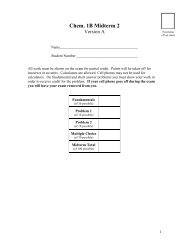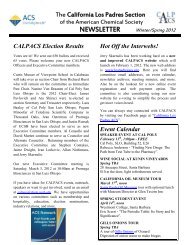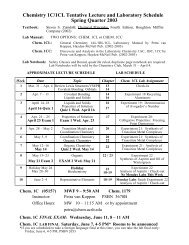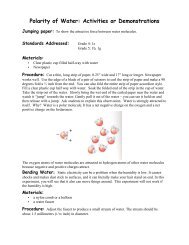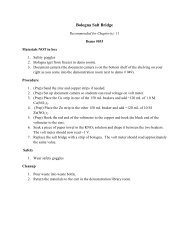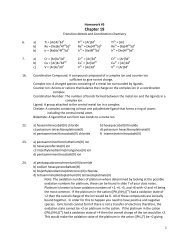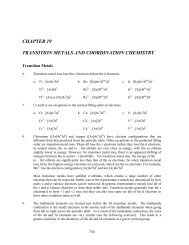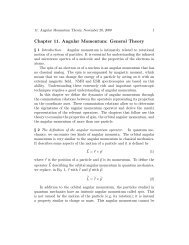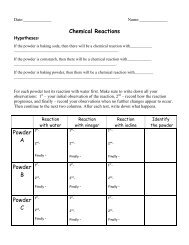Chemical Kinetics
Chemical Kinetics
Chemical Kinetics
You also want an ePaper? Increase the reach of your titles
YUMPU automatically turns print PDFs into web optimized ePapers that Google loves.
Syllabus for Chemistry 111<strong>Chemical</strong> <strong>Kinetics</strong>Class meets: Tue, Thu 12:30 – 1:45 PM Girvetz Hall 1112Instructor: Professor Kalju Kahn, Office: PSB-N 2623E-mail: kalju@chem.ucsb.eduPhone: (805) 893-6157Office Hours: Tue, Thu (5:30-6:30 PM) or by appointmentCourse website: http://www.chem.ucsb.edu/~kalju/chem111Lecture Textbooks:Recommended: “Principles of <strong>Chemical</strong> <strong>Kinetics</strong>" by J. E. House, 2007Recommended: “Physical Chemistry: <strong>Kinetics</strong>” by Horia Metiu, Taylor & Francis, 2006The Course:The main goal of Chem 111 is to teach principles of reaction kinetics and catalysis. Topics covered includethe laws and theories governing rates of chemical reactions and reaction mechanisms in the gas phase, insolution, and at the solid-liquid interface. Emphasis is placed on modern experimental approaches to studykinetics in complex chemical and biochemical systems. Analysis of experimental data is introduced.Computational approaches to estimate rates of chemical reactions and study the mechanism of catalysis arediscussedExpectations of Students:1) Attendance and taking good lecture notes is expected. Supplementing the lecture notes with studynotes based on the textbook(s) is a good way to improve your chances to be successful in this course.2) The House textbook has many excellent worked-out problems. The practice problems in the book arequantitative and require a good understanding of the math. I will suggest which ones are good tosolve but you are free to tackle more difficult problems on your own.3) Two mid-terms (each 80 points) and a final exam (200 points) will be given. The two mid-terms testyour knowledge of topics covered prior to exam. The final will cover all the topics that were taught inthis course and also test your ability to understand the material. There are two 20-point homeworks.4) Honesty and academic integrity must be always preserved. While working with others is encouragedoutside the classroom, you must answer the homework and exam questions individually. Nosupplemental material should be used during an exam.5) No student shall give, sell, or otherwise distribute to others or publish any electronically availablecourse materials or recordings made during any course presentation without the written consent of theinstructor.6) There are no excuses for class absence, especially on the exam days. There are no make-up exams. Ifyou must miss a test, contact the lecturer in advance and provide a verifiable doctors excuse.7) The grade is based on the number of points out of 400 points total. The last time I taught, there were5 As, 6 Bs, 1 C, 1D, and 1 F in the course.
Study tips:‣ Read the relevant material before the class meets. I like to interact with students during ourmeetings and you enjoy the lectures more if you can think along‣ Review (or rewrite) your class notes the same day and supplement them with material from thetextbook and other resources (books, Internet). Ask for help if something remains unclear.‣ Do not even hope that you can be successful by trying to memorize all the material few daysbefore the exam. The final exam expects that you understand, not only remember the material.The CHEM 111 course rests on three pillars:▌how to collect kinetic data,▌how to analyze kinetic data▌how to interpret kinetic dataProposed Topics for Fall 2013The course is taught in a highly non-linear fashion: instead of covering each of the pillars in onemonth, we will start climbing up all three pillars roughly simultaneously. The course starts bydiscussing (i) how to study simple reactions with methods that you are well familiar with, and howto interpret the results with quite simple models. We then proceed to more difficult reactions thatwill be studied with more complex methods, require more advanced calculus, and rely on moreadvanced theory for interpretation. I am open to suggestions from students, so if you have somespecial interests, please let me know.1) Experimental techniques to study reaction kinetics- Principles of signal detection; separation methods vs. continuous monitoring- Optical Spectroscopies: UV-Vis, Fluorescence, Circular Dichroism- Rapid mixing techniques- Pressure and temperature jump methods- Flash photolysis, Pulse radiolysis, Discharge flow- Monitoring of protein folding and unfolding- NMR as a tool to study both slow and fast reactions2) Analysis of experimental kinetic data- Simple irreversible reactions- Reversible reactions and relaxation kinetics- Parallel reactions- Consecutive reactions- Autocatalysis3) Theories of chemical reactions- Potential energy surfaces- Transition state theory: Fundamental assumptions- Thermodynamic formulation: Rate constants and activation barriers- Isotope effects and transition state theory4) Analysis and modeling of chemical reactions with Mathematica®
Lecture and Lab Schedule:Apr 2Apr 4Apr 9Apr 11Apr 14Apr 15Apr 18Apr 23Apr 25Apr 26Introduction to <strong>Chemical</strong> <strong>Kinetics</strong>.Measurements of Reaction RatesRate laws: differential and integrated forms, determination of reaction orderFirst-order irreversible reactions: principles and data analysisFirst homework due. Determination of reaction order and mechanismFirst-order reversible reactions. Relaxation methods for fast reactionsParallel reactions. Temperature- and pressure dependence of equilibrium and rate constantsDiscussion of Jacob paper. Second- and higher order A + nA →P type reactionsMidterm ILast day to drop classesApr 30 Second-order A + B →P type reactions; flow tube reactions and fluorescence detection methodsMay 2 Introduction to Mathematica (Computer Lab, Chem 1153)May 7May 9May 12Reversible mixed and second order reaction s; pseudo-first-order approximationConsecutive reactions. Study of fast reactions: stopped flow, continuous flow, quenched flowSecond homework due. Study of reversible reactionsMay 14 Review of linear algebra. Discussion of Egawa paper.May 16 Mathematical analysis of A →B→C kinetics (Computer Lab, Chem 1153)May 21May 23Pharmacokinetics.Collision theory. Transition state theory. Kinetic isotope effectMay 28 Midterm IIMay 30 Computational modeling of transition states and reaction rates (Computer Lab, Chem 1153)June 4 NMR for study of rapid reaction kineticsJune 6 NMR in kinetics: data collection (NMR room, PSB-N 3614) followed by analysis in Chem 1153)June ?Final ExaminationGood luck! — Kalju


